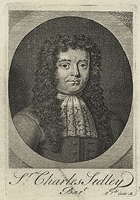Sir Charles Sedley
Sir Charles Sedley Poems
Phyllis is my only joy,
Faithless as the winds or seas;
Sometimes coming, sometimes coy,
Yet she never fails to please;
...
NOT, Celia, that I juster am
Or better than the rest!
For I would change each hour, like them,
Were not my heart at rest.
...
Cloris, I cannot say your eyes
Did my unwary heart surprise;
Nor will I swear it was your face,
Your shape, or any nameless grace:
...
Love still has something of the sea,
From whence his Mother rose;
No time his slaves from doubt can free,
Nor give their thoughts repose.
...
AH, Chloris! that I now could sit
As unconcern'd as when
Your infant beauty could beget
No pleasure, nor no pain!
...
O'er the Desert, cross the Meadows,
Hunters blew the merry Horn ;
Phoebus chas'd the flying Shadows :
Eccho, she reply'd, in Scorn ;
...
Ah, Chloris! could I now but sit
As unconcern'd as when
Your infant beauty could beget
...
"Hears not my Phyllis how the birds
Their feathered mates salute?
They tell their passion in their words:
Must I alone be mute?"
...
Sir Charles Sedley Biography
English wit and dramatist, was born about 1639, and was the son of Sir John Sedley of Aylesford in Kent. He was educated at Wadham College, Oxford, but left without taking a degree. He was member of parliament for New Romney in Kent, and took an active and useful part in politics. Sedley is famous as a patron of literature in the Restoration period. Famous for his wit, he was a member of the intimate circle of young rakes at the court of Charles II. As a writer, he gained a deserved reputation alike for the clearness and ease of his prose and for a certain poetic gift, more appreciable in his occasional lyrics than in the serious parts of his dramas. He wrote several plays, his first comedy, written in 1668, The Mulberry Garden is based, in part, on Molière’s L’École des Maris and is written in that mixture of prose and heroic couplets which Etherege introduced in his Comical Revenge. Bellamira or The Mistress written in 1687 a licentous comedy is supposedly his best which, though founded on the Eunuchus of Terence, presents a lively, if coarsely realistic, picture of the reckless pursuit of pleasure of Sedley’s day. He has written two tragedies Antony and Cleopatra (1667) and The Tyrant King of Crete (1702). He also produced a play The Grumbler (1702), an adaptation of Le Grondeur of Brueys and Palaprat. He also wrote amorous lyrics. Phyllis is my only joy, his famous song is widely known.)
The Best Poem Of Sir Charles Sedley
Phyllis Is My Only Joy
Phyllis is my only joy,
Faithless as the winds or seas;
Sometimes coming, sometimes coy,
Yet she never fails to please;
If with a frown
I am cast down,
Phyllis smiling,
And beguiling,
Makes me happier than before.
Though, alas! too late I find
Nothing can her fancy fix,
Yet the moment she is kind
I forgive her all her tricks;
Which, though I see,
I can't get free;
She deceiving,
I believing;
What need lovers wish for more?
